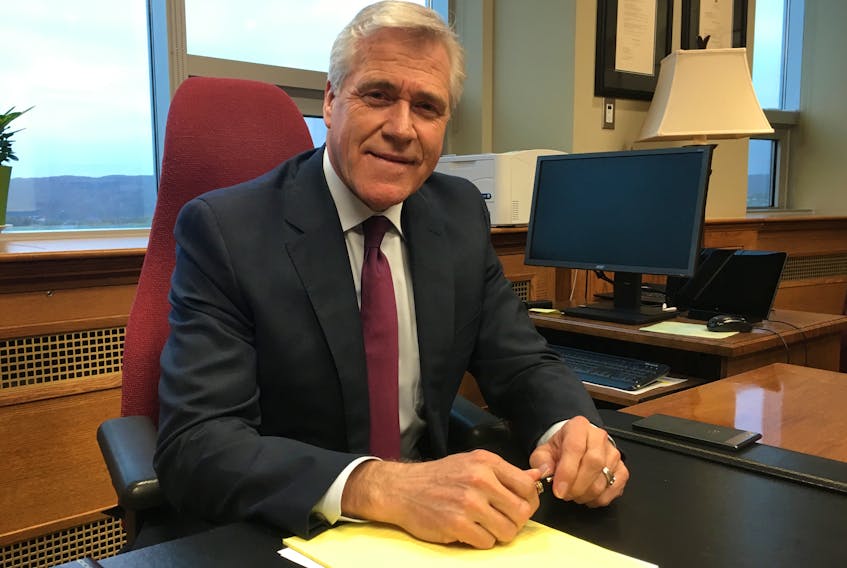Like the rest of Canada, Newfoundland and Labrador has a lot on the line in ongoing, cross-border trade negotiations.
But there are some elements of specific concern for this province.
The fate of the Corner Brook Pulp and Paper mill, being a lynchpin for much of the province’s forestry industry, with 5,000 jobs, is one of those.
Another concern being discussed in North American Free Trade Agreement (NAFTA) renegotiations is Canada’s supply-management system, currently maintaining economic protections for Canadian dairy and poultry products and producers.
U.S. President Donald Trump has made it clear he’s no fan of the system Canada has had in place since the 1970s to protect local farmers from being swamped by American challengers with cheaper products.
“Canada charges the U.S. a 270% tariff on Dairy Products! They didn’t tell you that, did they? Not fair to our farmers!” read a June 8 blast on Twitter from @realDonaldTrump.
As he tweeted on Sunday, June 10: “Fair Trade is now to be called Fool Trade if it is not Reciprocal … Tax Dairy from us at 270%. Then Justin acts hurt when called out!”
Protectionist tariffs for Canada on dairy and poultry as part of the supply-management system have been a touchstone for the American president lately.
But Trump is not alone in challenging the status quo in Canada, with challengers on this side of the border also interested in change, to differing degrees.
For example, as the CBC reported, Maxime Bernier was removed from the Conservatives’ front bench in the House of Commons by Conservative Leader Andrew Scheer earlier this week, in a move attributed to Bernier’s comments in an unpublished book, reportedly speaking to “fake Conservatives” who joined the party to defend the supply-management system.
This week, The National Post published a piece calling out Canada’s Conservatives for supporting supply management. The piece described it as stifling consumer choice and “backdoor corporate welfare.”
The Fraser Institute has long beat the drum against keeping supply management, pointing to higher costs for consumers. An opinion piece published in Maclean’s in January from two representatives of the Fraser Institute was entitled, “Why is Canada jeopardizing NAFTA to protect 13,500 farmers?”
Dalhousie University professor Dr. Sylvain Charlebois has been quoted in multiple media reports in recent days on the fact Canada is the last country with such a system — something he said was established to support food sovereignty, but does not reflect Canada’s position as a country supportive of free trade.
Politically in Canada, as shown in Bernier’s case, the tide has yet to turn. But that’s not to say supply management is without opposition.
On the other hand, there have been challenges to America’s subsidies for farmers, while Canadian farmers have pushed back, telling their stories.
Quebec’s agriculture federation has identified significant costs if protections on dairy in particular were to be removed, including expected loss of the province’s family farms.
Newfoundland and Labrador Federation of Agriculture president Merv Wiseman says that, ironically, Quebec has been a protector in a sense. Newfoundland and Labrador’s agricultural sector is less concerning politically on the federal level, but dependent on protection of income for chicken, egg and dairy farmers.
RELATED LINK:
Protect supply management: dairy farmers
Products covered by supply management amount to about 75 per cent of agricultural production (by total farm cash receipts) in this province, according to Statistics Canada.
“If supply management were to disappear … we would suffer immensely in this province from a production standpoint,” Wiseman said Wednesday.
Apart from the livelihoods of farmers, he said there are implications for food self-sufficiency — something the provincial government has been tackling under the current Liberal leadership.
Premier Dwight Ball was asked about any change to supply management in the new NAFTA.
“This is a bit of back and forth that we’re seeing right now,” he said.
“We see differences of what the Canadian negotiators, their position would be, and what the U.S. negotiators, their position would be, or what Trump is saying, and there seems to be a lot of variables and a lot of differences on how we visualize Canadians supply management and the impact Trump is saying that it’s having on farmers in the U.S.”
Earlier this year, the provincial Progressive Conservatives — specifically longtime farmer and new MHA Jim Lester — flagged supply management in NAFTA as a concern.
“We need to stand together and fight any efforts by the Trump administration or others to do away with the supply management system,” he said in a statement issued to the media.
“With all sectors of the Canadian economy in America’s crosshairs, we have to ensure our best interests aren’t left on the sidelines or bartered away.”
As recently reported by The Chronicle Herald, Canadian dairy farmers have been spooked by recent statements by Prime Minister Justin Trudeau on the subject. The June 6 report noted Canada already imports about five per cent of its cheese and five per cent of its butter from other nations, as part of World Trade Organization commitments. Through the Canada-European Union free trade deal, Canada increased local access for European cheese producers by another four per cent. The Trans-Pacific Partnership agreement, it stated, saw additional access equal to three per cent of Canada’s total milk supply.









